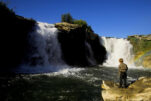Science Smarts: Somethin’ fishy about this!
By Patty Rooks on November 11, 2023.
Recently, I had a friend who put some fish into their pond. An interesting question was asked: “Why you would do that now; won’t they freeze?” Of course, with temperatures dropping and winter setting in, this seemed like a logical question and, of course, it made me wonder as well. You know me – I had to investigate just how fish can survive in water temperatures that are below the freezing temperature of their blood. How does this work? Let’s get started! *Remember to ask an adult before doing this experiment. Materials – Large bowl – Crushed ice – Rock salt – Measuring cup – Measuring spoon – Safety goggles – Rubbing alcohol – Canola oil – Water – Masking tape – Marker – Three similar glass jars – Large spoon/wooden spoon to stir with – Science helper Procedure 1. Always wear your safety goggles as you will be working with rubbing alcohol which is poisonous and you do not want to get any in your eyes. 2. Using the masking tape and marker, label the three glass jars: “water,” “oil” and “rubbing alcohol.” 3. Fill each jar with 250 mL (one cup) of each liquid as you labeled them. Put the lid on TIGHT! 4. Fill the bowl about half full of ice. Add 250 mL (one cup) of salt and stir it up well. 5. Carefully place the jars in the ice/water mixture. 6. Observe. What is going on? Since you cannot observe how a fish actually behaves in the sub zero temperatures of the water, you are experimenting with different liquids in order to better understand how different liquids freeze at different temperatures. You should have observed the oil beginning to solidify after a few minutes. A lump would have started forming and began to grow over time. The water may have even begun to freeze a little bit over time. No matter how long you observed this experiment for, the rubbing alcohol would not have froze ONE BIT! This is because the freezing point of all these liquids is vey different. This is what scientists have also discovered with fish. A fish’s blood does not freeze because it has a special antifreeze protein in it. Scientists have discovered that these proteins prevent the water in the blood of the fish from freezing so they can live all winter long no matter how cold their home gets! Patty Rooks, Senior Scientific Consultant PRAXIS, “Connecting Science To The Community.” Contact Praxis at praxis@praxismh.ca, http://www.praxismh.ca, Tweet or follow us @PraxisMedHat, or friend us on Facebook. Address: 12 826 11th Street SE, Medicine Hat, AB, T1A 1T7 Phone: 403-527-5365, email: praxis@praxismh.ca. 32-31




